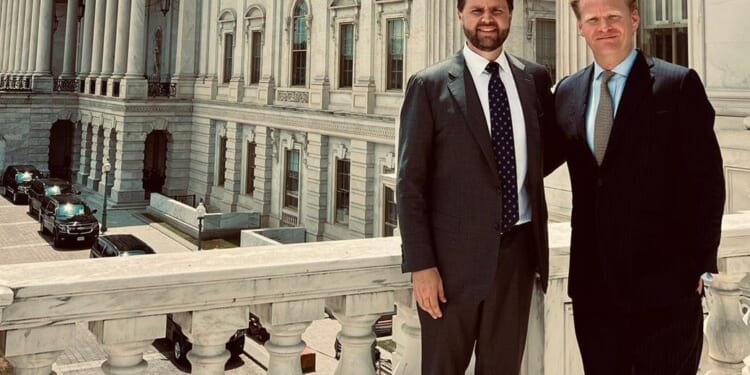The Divinity Faculty building at the University of Cambridge is not the Cambridge of postcards and Hollywood. It’s a strange, squat structure, Pacman-shaped from the bird’s-eye point of view, mostly constituted out of windowpane, and enclosed within a shiny exoskeleton of silver bars. Someone once told me that it was designed to look like a scroll, complementing the red-brick History Faculty next-door, which is supposedly an open book. I confess that I don’t see much of a resemblance.
Cambridge’s Divinity Faculty once boasted the world’s finest erudition — Erasmus, Archbishop Whitgift, and the “greatest scholar that England or perhaps that Europe ever bred”, Richard Bentley. Now it’s the kind of institution that “challenges itself… to think more deeply about race and to learn from those who have been marginalized”. A few years ago, Jordan Peterson was offered a visiting fellowship; a gaggle of students and academics ensured that this was abruptly rescinded. When Peterson was re-invited to Cambridge some time later, a group within the faculty, calling itself “Divine Dissent”, resolved to expose the “alt-/far-Right influence” in their midst. They doubtless had a particular character in mind.
James Orr, Associate Professor of the Philosophy of Religion at Cambridge’s Divinity Faculty, is best known to the world as JD Vance’s “British sherpa“. He has recently acquired a further title: Nigel Farage’s Svengali. He has been dipping his toes into turquoise waters for some time: his think tank, the Centre for a Better Britain, is housed with Reform HQ at Milbank Tower, and has been busily supplying the intellectual foundations for Farage’s wider project. Orr might be to Farage as Keith Joseph was to Thatcher, or Anthony Giddens to Blair. As Farage’s senior adviser, Orr’s principal task is to prepare for government.
The Britain which Farage and Orr hope to inherit has, it would be fair to say, seen better days. It is plagued by sporadic bouts of violence; its social contract seems to be falling apart; there is little economic growth to speak of, and even less any notion of national ambition or self-belief. The British people are responding to the hanging sense of gloom in various ways: some by throwing their lot in with Zack Polanski or Zarah Sultana; others, who made their presence felt at the Unite the Kingdom rally, by committing themselves to a renewed kind of Christian nationalism. Orr is convinced, like many, that Britain’s present crisis is fundamentally spiritual. Who better to cure the nation’s souls than a Cambridge divine?
Orr has already been engaged in some soul-curing closer to home. About two-and-a-half miles northeast of Cambridge’s Divinity Faculty is the Moorings, Orr’s sprawling estate. The Catholic writer Rod Dreher once excitedly described the Moorings as a “form of the Benedict Option”, putting into practice his recommendation, in his book of that name, for Christians to retreat from the world and form communities of their own. Orr, for his part, jokes that the Moorings is a “Right-wing Mecca”. The whole place sounds almost like a Cambridge college, perhaps even a “safe space”: somewhere for young people of a particular disposition to rub shoulders and nourish their minds, far away from the Harry Potter shops and Progress Pride flags that have taken over the city centre. Clearly it is not quite Benedictine: it’s more like a Cambridge Asturias, preparing for an anti-woke Reconquista. Half the Right-wingers at Cambridge seem to have moored themselves there at some point or other, lodging in huts in the garden like a revolving cast of Catholic gnomes.
Orr is very much a man of the establishment. Like Boris Johnson, he grew up in Brussels and read Greats at Balliol; in the intervening years, he was the year above Rishi Sunak at Winchester. He is a devout follower of Sir Roger Scruton, whose bust watches over his home and whose Legacy Foundation he helps to run. What sets him apart among Scruton’s many scions on the conservative landscape is his fluency in both languages of the contemporary Right. Here his middle-agedness is an asset. With the old Tory patricians, he can harp on about faith, family, flag, freedom, and “common sense” — although, since his jump to Reform, he has been able to speak about the “dinosaurs” more freely. He is equally in his element with the younger, hard-edged “new Right”, which is laser-focused on immigration and views all else as a frivolous sideshow. When interviewed by Steven Edginton on GB News, Orr is at ease in such “very online” matters as “Yookay Aesthetics”. He endears himself to his interviewer with his knowledge of Lee Kuan Yew quotations and his roster of statistics about demographics. It’s hard to imagine a “postliberal” of the old school launching into the conversation with such gusto.
At one point in that interview, Orr laments that Cockney English is in decline. His affection for Cockney may help explain his improbable friendship with Tom Skinner, who describes Orr as “one of the most educated geezers” he knows. Orr’s mission in Reform is to bring in talent, and Skinner has been touted as a potential standard-bearer, even perhaps a London mayor. Interviewing Matt Goodwin on his podcast, First Light, Orr worries that Reform has a personnel problem, and urgently needs to attract bright young things to prepare for government. One wonders whether there will be any Moorings alumni on the ballot in 2029.
But strange things are afoot on the religious Right, especially on the younger end. The self-declared “Reactionary Catholic Zoomer” Connor Tomlinson, who is close to Liz Truss and Ayaan Hirsi Ali and boasts almost 100,000 followers on X, questions whether those adhering to “any faith other than Christian”, or belonging to “any ethnicity besides British”, should be allowed to hold public office.
Then there’s the Reverend Calvin Robinson, who, like Tomlinson, is an affiliate of the Lotus Eaters podcast, and who has spent the last few years jumping from one Christian domination to another. Earlier this year he was defrocked by the Anglican Catholic Church in America for doing what appeared to be a Nazi salute at the National Pro-Life Summit. Tommy Robinson, meanwhile, loudly proclaims that he has found God, and what remains of UKIP marches under the Cross. In reaction, perhaps, to rising sectarian politics under other guises, Christian nationalism is now finding form on the fringes. Fearing that Reform might follow suit, Neville Watson — until recently the party’s only black branch chair, and himself an evangelical Christian — has decided to quit.
“Part of Orr’s task will be to rein in the overexcitable youngsters, for pragmatic as well as conscientious reasons.”
Towards the end of his conversation with Edginton, Orr expresses some reservations about the more radical elements. He is eager to disavow any conspiratorial thinking about mass migration. Nor, he maintains, did it ever occur to him or his fellow Wykehamites in the Nineties that the teenage Sunak was anything other than English. In response to Edginton’s insistent call for mass deportations — he tends to close his interviews this way — Orr insists that Farage has to “broaden out” and can’t “keep throwing red meat to the base”. The Caerphilly byelection has since proved the point: Reform must be careful not to frighten too many people into tactical voting. Part of Orr’s task will be to rein in the overexcitable youngsters, for pragmatic as well as conscientious reasons.
Orr might, however, compound Reform’s problems. Farage’s closeness to the Trump administration is already a millstone around his neck (he will be painfully aware of what happened to Pierre Poilievre in Canada): 55% of British voters dislike the American President. Orr’s buddy Vance is running at net disapproval even among Reform voters; of those who supported the Conservatives last year, 68% views him negatively. Nor will Reform be much helped by Orr’s views on social policy. His opposition to abortion under all circumstances is shared by only 6% of the public — hardly the stuff of a populist mass movement.
American conservatism is off-putting to the British mainstream in part because of its religious style. The gaudy enthusiasms of the evangelical Right are liable to produce an aesthetic revulsion in the British observer; something of this was conveyed even by Orr himself, when he remarked, of Charlie Kirk’s memorial extravaganza, that it was “not quite how we do things in Britain”.
Ultimately it would not be in Reform’s interest to become, or to be seen as, a “Christian party”. Indeed, the nonreligious currently outnumber Christians among Reform voters. The politics of the established church, meanwhile, are far more “Divine Dissent” than “the Moorings”: observe the recent furore over graffiti in Canterbury Cathedral, criticised by JD Vance, and Farage’s quarrel with the Archbishop of York. Britain’s actually-existing Christian politics, then, it is not one that Right-wingers tend to care for.
Orr is but the latest conservative Christian public intellectual to find himself swimming upstream in this manner. As another resolutely Right-wing Cambridge don, Maurice Cowling, once recognised, “the habitual sensibility in contemporary England is post-Christian or anti-Christian [and] it will require both intellectual effort and an effort of the will if it is to be modified”. Cowling was hopeful on this score, but it must be admitted that it hasn’t happened yet for a reason. There is plenty of effort and plenty of will coming out of the Moorings, but their fruits will find little appetite among the secular British public.

















